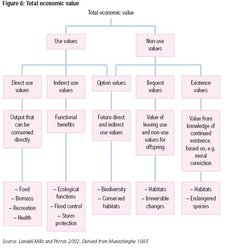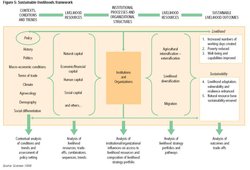Human well-being and livelihoods in Africa
Improving human well-being is at the core of sustainable development efforts in Africa. Environmental goods and services, including supporting services such as soil formation, provisioning services such as wood, regulating services such as water purification, and cultural services provide important opportunities for meeting human development goals.
Human well-being is multidimensional. It is the ability of all people to determine and meet their needs and to have a range of choices and opportunities to fulfill their potential. It includes tackling a diverse range of challenges – environmental, social and economic – and widening the options available to people to make a living and to participate actively in society. Sustainable livelihoods that guarantee access and entitlement to a range of assets and opportunities are essential to achieving human well-being. Such livelihoods are not limited to, for example, a particular level of income, paid labor or ability to meet household food security, but must include opportunities for investment and business, national economic stability and reliable and accountable governance systems.
A livelihood comprises the capabilities, assets (including natural, social, human, physical and financial) and activities required for a means of living. A livelihood is sustainable when it can cope with and recover from stresses and shocks, maintain or enhance its capabilities and assets, while not undermining the natural resource base. Figure 1 depicts the livelihood framework, illustrating the linkages between the various livelihood aspects.
Environmental and economic changes can introduce vulnerabilities to human well-being and undercut opportunities for development. Improved human well-being is critical to increasing the range of options, choices and responses people are able to make to mitigate and adapt to such changes.
Coping mechanisms, in poor communities, often include intensification of existing productive activity, diversification by adopting additional productive activities and migration to develop productive activity elsewhere.

Income and services derived from environmental resources, including land, forests and woodlands, freshwater and wetlands, coastal and marine resources, and wildlife (flora and fauna) are central to the livelihoods of many rural people and to Africa’s economy as a whole. People derive multiple values from natural resources, including use and non-use values. Option values may include use and non-use aspects, and refer to the value placed on the resource as an option for further use. Existence value refers to the benefits derived from knowing the resource exists, such values often being associated with religious and cultural meaning. Bequest value is the value placed on being able to pass natural resource assets onto future generations. These values are reflected in Figure 2.
Poor people have not been able to effectively capture the full benefits associated with the use of natural resources. This is partly because resources are used primarily for subsistence and value-adding and marketing is neglected. Maximizing the opportunities requires moving beyond a subsistence framework which focuses on minimum or basic needs, to using the available resource in an efficient, equitable, productive and sustainable manner. Increasingly, livelihood approaches have focused on how this resource can be used as an asset for improved human well-being and promoting development. Options for increased investment, employment creation in processing, trade and related services, and small and micronatural resources-based entrepreneurship are increasingly considered. The commercialization of wild resources offers important opportunities for improving income and other aspects of well-being. Widening the options for poor people requires promoting opportunities for them to capture a greater share of the value generated through, among other things, better market access, less bureaucratic restraints on trade and better access to capital and other resources. Achieving better opportunities requires complementary policy development in other areas including good governance, tenure regimes and global trade.
Further Reading
- Millennium Ecosystem Assessment, 2005. Ecosystems and Human Well-being: Synthesis. Millennium Ecosystem Assessment. Island Press, Washington, D.C.
- Prescott-Allen, R., 2001. The Well-being of Nations: A Country-by-Country Index of Quality of Life and the Environment. In cooporation with International Development Research Centre, IUCN, The World Conservation Union, International Institute for Environment and Development, Food and Agricultural Organization of the United Nations, Map Maker Ltd, UNEP World Conservation Monitoring Centre. Island Press, Washington
- Scoones, I., 1998. Sustainable Rural Livelihoods: A Framework for Analysis. IDS Working Paper No. 72. Institute of Development Studies, Brighton.
- UNEP, 2006 Africa Environment Outlook 2: The Human Dimension
- WRI in collaboration with UNEP, UNDP and the World Bank, 2005. World Resources 2005: The Wealth of the Poor – Managing Ecosystems to Fight Poverty.
|
|
| Disclaimer: This article is taken wholly from, or contains information that was originally published by, the United Nations Environment Programme. Topic editors and authors for the Encyclopedia of Earth may have edited its content or added new information. The use of information from the United Nations Environment Programme should not be construed as support for or endorsement by that organization for any new information added by EoE personnel, or for any editing of the original content. |
